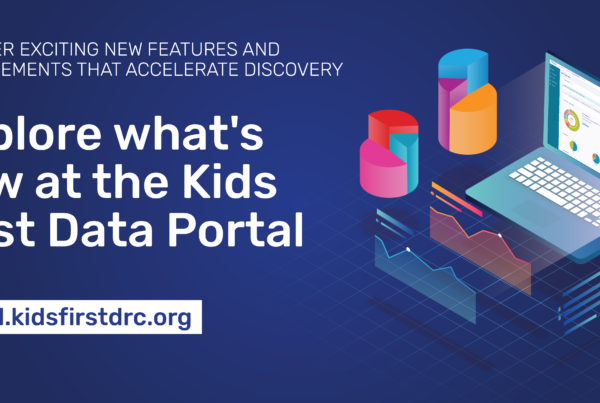The Kids First Fall Webinar gathered a diverse panel of speakers from Brazil, Argentina, and the US and an audience of 100+ attendees bringing researchers, clinicians, government, foundations, and patient families together. The topic of Collaborate to Accelerate Discoveries in Pediatric Research could not be more relevant.
Collaboration for the Kids First program means developing a cloud resource and providing support for genomic data generation, data sharing, and data analyses to accelerating discoveries to help doctors and untimely alleviate suffering for patients and families. This collaboration involves teams at the NIH, Data Resource Center, Genomic Sequencing Centers, X01 investigators, and researchers internationally. The level of collaboration to bring discoveries closer to patients and families is not to be underestimated. The speakers emphasized how Kids First is building a resource bringing together multiple data types in multiple pediatric conditions with rich information on phenotypes and clinical data. This is turn helps on a better understanding of the biology of datasets and accelerates translational research.
The webinar started with a presentation on what I learned about the Kids First Program. Then we heard from Drs. Joaquin Espinosa, Nara Sobreira, and Hakon Hakonarson, who presented on their research using the Kids First portal across pediatric conditions. Drs. Adam Resnick and David Higgins closed the event by presented on genomic data access and analysis tools available within the Kids First Portal. Dr. Resnick highlighted the genetic variant browser, and genomic data access via the portal.
Dr. Espinosa shared how work with multidimensional data and trans-disciplinary research teams can accelerate the translation of discoveries to help individuals with Down Syndrome. With the Kids First Data Resource Center in “the center of the pediatric genomic data universe” it empowers multidimensional research through interoperability between data resources such as dbGaP, BioData Catalyst, Cancer Research Data Commons, AnVIL, and INCLUDE among others. This is helping Dr. Espinosa to accelerate discoveries of potential targeted therapies for persons with Down Syndrome such as JAK inhibitors currently being tested in clinical trials. Dr. Espinosa “balances his hectic professional life with organic gardening, trail running, and the occasional guitar playing”. He “hopes to inspire members of the audience to think of ways of exploring outside of their comfort zone toward acquiring new data types and establishing trans-disciplinary collaborations. He would also hope to inspire scientists to join the ongoing renaissance of Down syndrome research.”
Dr. Sobreira, “a clinician, researcher, teacher, and mother of a 5-year-old child”, presented on how genomic sequencing of patients with cartilage tumors, vascular anomalies, and cancers have identified genes and variants that can help with prognosis, guidelines, reproductive counseling, and investigation of pharmacological treatments. She highlighted the relevance of finding the right datasets and being able to combine datasets representing multiple types of pediatric conditions. Dr. Sobreira reported access to over 800 genomes from the Pediatric Brain Tumor Atlas through interoperability between Kids First and Cancer Research Data Commons. Dr. Sobreira wishes that her talk helps the audience to “understand the importance of genomics in the field of rare disease and cancer and how these fields can help each other to find more effective pharmacological treatments for our patients.”
Dr. Hakonarson discussed the complexity of analyzing genomic data from pediatric conditions with multiplicity of phenotypes to develop a single molecular diagnosis for both congenital anomaly and cancer. With help from the Kids First Data Resource Center, he compiled a pediatric cohort with congenital anomalies and cancer. He showed results on how prioritizing genetic variants can make a difference to address phenotypes and the utility to extend analysis to the gene non-coding regions, which are silent regions in the genome.
Feedback from the audience acknowledged progress in data access through dbGaP and availability of valuable resources through Kids First Portal. We received feedback that researchers need more convincing on the benefit of cloud computing specially for people who are new to pediatric genomics research. To address this question the Kids First program launched a cloud credit pilot to support initial projects using Kids First data and CAVATICA, a cloud computing platform powering Kids First portal. Many attendees expressed interest in learning more about Kids First program and suggested step-by-step tutorials on how to access data and leverage cloud resources through CAVATICA. We are taking the feedback to heart and working with our teams to provide additional forums for more in-depth technical tutorials. In the meantime, the Kids First Data Resource staff offers office hours to users and all those interested in conducting research through the portal.
We hope the webinar inspired you to start exploring Kids First Program resources and support. We thank again our speakers for sharing their wisdom in genomic pediatric research.
Watch the webinar recording at the Kids First Website.










